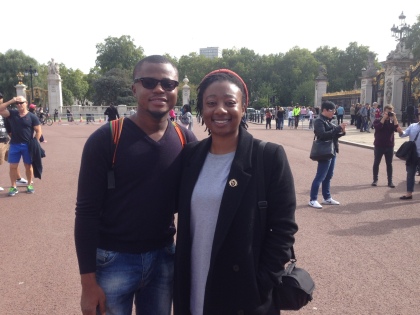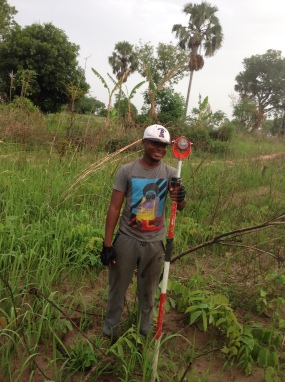Jamal Musah on his ICS placement, Agricultural Entrepreneurship and the Queens Young Leader Award.
“The environment of trust was created by ICS: Challenges which allowed us to honestly share our strengths and weaknesses and create something powerful from this collaborative experience.”
Challenges Worlwide:ICS alumnus Jamal Musah, is a 26 year old agricultural entrepreneur, climate change activist and more recently, a highly commended runner up in the Commonwealth Queen’s Young Leader Award.
We caught up with him on Skype last week to hear all about his inspiring story and to discuss the value his placement with Challenges Worldwide has in his incredible journey from university student to a recognized young Changemaker.
Jamal grew up in the Ghanaian city of Kumasi and was the youngest in a large family. At university, he studied business with a major in accountancy. Whilst at university, Jamal began volunteering with Green Cross Ghana which was the first step towards realizing his passion for social issues. Volunteering with this environmental group highlighted the significance of climate change and the disastrous effects that it was having in his country. This is when Jamal began mobilizing the youth and getting schools involved.
After completing university, Jamal had a strong academic background in business and accountancy but a real passion for development and social issues. He had job offers in the financial sector but when his cousin recommended the DFID funded, ICS programme with Challenges Worldwide, Jamal jumped at the chance! A placement with Challenges Worldwide:ICS is a 12 week, funded opportunity to volunteer in a cross cultural team of young people in the role of a junior business associate. The valuable combination of NGO work in a Ghanaian business suited Jamal’s skillset to a tee!
Below, Jamal describes some highlights of his placement with Challenges Worldwide:
‘The entrepreneurship bit was what got me going. I had got a job offer, but I believed that I had to do what I was passionate about. So I chose this.’
In my placement I was involved in Agriculture.
I worked with Nurtric Food, a company that produced mushrooms. During my placement we worked on their marketing and their finance. At the moment we went there, they were at the point of shutting down. We helped them create a problem statement and by amalgamating their scattered records, it created an overview, which in turn created focus. Our first impressions were that this company was not profitable, but when we actually sat down and worked through processes and figures – we realized how profitable it could be.
This is when I saw how important proper business processes (ie records, finance) were in every business, particularly agriculture.
They have now expanded operations and employed 2 new people after we left. Initially they supplied a few hotels, now they have expanded, more hotels, shopping malls and even retail operations – they are now packaging which makes this possible.”
Throughout their ICS placement, every in country volunteer like Jamal is paired with a UK counterpart and they work together throughout their time in the business.

“Elizabeth was my partner. She was a smart, amazing lady – she is actually now one of the best friends I have. When I started my placement, I had problems with focus and I had my own way of tackling my issues. So, what we then did, we blended both our ways together. It really was collaborative working. By sharing an experience both in Ghana and the UK we leant to trust each other. The environment of trust was created by ICS: Challenges which allowed us to honestly share our strengths and weaknesses and create something powerful from this collaborative experience.
Elizabeth is now working as a consultant in the UK, she is doing really well.”
Post ICS placement, with his newfound knowledge of the Ghanaian agriculture sector, Jamal realized that he actually had the tools to make real change happen as an agricultural entrepreneur. With support from his large family, Jamal raised the funds to buy 100 acres of land. Combining his passion for tackling climate change and his mind for business, Jamal decided he would use 50% of the land for sustainable agriculture and the other 50% to set up a school at which he hoped to teach local farmers the methods needed to rear crops sustainably.
“After ICS I realized that this is something I wanted to go into. But it was just me. My family gave me the support to get started.
Last month I started land preparation and have now just started cultivation. I am starting up with Maize – the main challenges is that in Ghana the Maize price fluctuates and there can be a lot of post-harvest losses. To add value, I must treat maize and learn how to get my product moving from farm to consumer.
In Ghana most farmers engage in bush burning which is a quick way to prepare the soil but rapidly leads to soil erosion, contributing to climate change. Instead, we will slash off waste and leave this to decay on the soil to minimize erosion, give nutrients to soil, also to controls moisture levels. Bush burning process actually gets rid of micro-organisms in soil, so more fertilizer needs to be used – we stop this at source, by using sustainable farming methodology.
 I have been lucky enough to gain support from the Centre of No-Till Agriculture – an agricultural consultancy specializing in sustainable agriculture. I am working with them to ensure the most sustainable methods are in use throughout my farm. No-Till are giving me free training in order to help me achieve this.
I have been lucky enough to gain support from the Centre of No-Till Agriculture – an agricultural consultancy specializing in sustainable agriculture. I am working with them to ensure the most sustainable methods are in use throughout my farm. No-Till are giving me free training in order to help me achieve this.
My land sits in a very deprived community without even drinking water. Over the next year I want to bring drinking water to community and also empower women and youth over 8 years – this would mean being able to send siblings to school. To do this I hope to use half my land as a training academy for farmers in the region providing employment to the people in a sustainable way. We train other farmers in this community – one of the reasons we are using No-Till, is because this is a really powerful training methodology. We use local farmers as contractors to do the work and at the same time train them.
I am now working with 4 people and am really excited to grow with my agri-business. I am so thankful for the experience I gained through my Challenges:ICS placement and have no doubt that it has inspired me to go into this sector with confidence.”
It has been really amazing to hear of Jamal’s journey from University student to Challenges Worldwide:ICS Changemaker. We have nothing but admiration and congrats for his recent achievement as a highly commended runner up in the Queens Young Leader Award.
To read more stories from our incredible alumni, visit www.challengesworldwideicsentreprenuer.com
